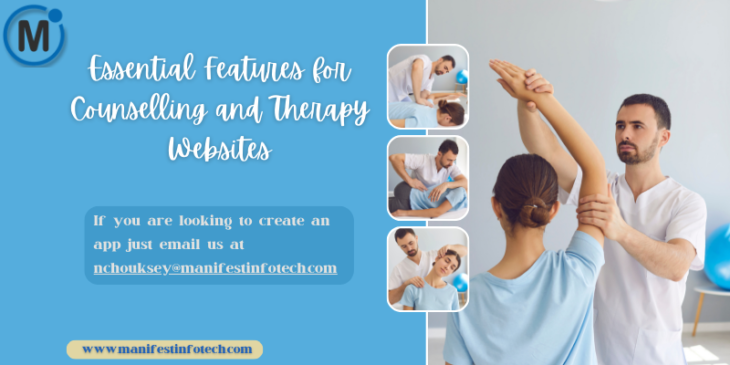
In this blog, we’ll explore the essential features that every counselling and therapy website should include:
𝟏. 𝐇𝐨𝐦𝐞𝐩𝐚𝐠𝐞 𝐰𝐢𝐭𝐡 𝐖𝐞𝐥𝐜𝐨𝐦𝐢𝐧𝐠 𝐈𝐧𝐭𝐫𝐨𝐝𝐮𝐜𝐭𝐢𝐨𝐧:
Your homepage sets the tone for your website and should provide a warm and inviting introduction to your counselling and therapy practice. Use engaging language to welcome visitors and communicate your commitment to supporting their mental health and well-being.
𝟐. 𝐀𝐛𝐨𝐮𝐭 𝐔𝐬 𝐏𝐚𝐠𝐞:
Use the About Us page to introduce your counselling and therapy practice, share your mission and values, and highlight the qualifications and expertise of your therapists. Personalize your brand by including photos and bios of your team members, along with any certifications or credentials they hold.
𝟑. 𝐒𝐞𝐫𝐯𝐢𝐜𝐞𝐬 𝐎𝐟𝐟𝐞𝐫𝐞𝐝:
Clearly outline the range of counselling and therapy services you offer, including individual counselling, couples therapy, family counselling, and specialized treatment modalities such as cognitive-behavioral therapy (CBT) or mindfulness-based therapy. Provide detailed descriptions of each service to help visitors understand how they can benefit from your expertise.
𝟒. 𝐀𝐩𝐩𝐨𝐢𝐧𝐭𝐦𝐞𝐧𝐭 𝐒𝐜𝐡𝐞𝐝𝐮𝐥𝐢𝐧𝐠 𝐒𝐲𝐬𝐭𝐞𝐦:
Make it easy for clients to schedule appointments by integrating an online scheduling system directly into your website. Allow clients to view therapist availability, choose appointment times that work for them, and provide their contact information securely.
𝟓. 𝐓𝐞𝐬𝐭𝐢𝐦𝐨𝐧𝐢𝐚𝐥𝐬 𝐚𝐧𝐝 𝐒𝐮𝐜𝐜𝐞𝐬𝐬 𝐒𝐭𝐨𝐫𝐢𝐞𝐬:
Build trust and credibility with potential clients by showcasing testimonials and success stories from past clients. Include quotes, testimonials, and case studies that highlight the positive outcomes of your counselling and therapy services.
𝟔. 𝐑𝐞𝐬𝐨𝐮𝐫𝐜𝐞𝐬 𝐚𝐧𝐝 𝐀𝐫𝐭𝐢𝐜𝐥𝐞𝐬:
Establish your counselling and therapy practice as a trusted source of information and support by providing resources and articles on mental health topics. Offer tips, strategies, and insights to help visitors manage their mental health and navigate life’s challenges.
𝟕. 𝐏𝐫𝐢𝐯𝐚𝐜𝐲 𝐚𝐧𝐝 𝐂𝐨𝐧𝐟𝐢𝐝𝐞𝐧𝐭𝐢𝐚𝐥𝐢𝐭𝐲 𝐏𝐨𝐥𝐢𝐜𝐢𝐞𝐬:
Assure clients of the privacy and confidentiality of their personal information by clearly outlining your privacy and confidentiality policies on your website. Provide information on how client data is protected and how confidentiality is maintained in counselling sessions.
𝟖. 𝐂𝐨𝐧𝐭𝐚𝐜𝐭 𝐈𝐧𝐟𝐨𝐫𝐦𝐚𝐭𝐢𝐨𝐧 𝐚𝐧𝐝 𝐅𝐨𝐫𝐦𝐬:
Make it easy for clients to get in touch with you by providing clear contact information, including phone number, email address, and office location. Additionally, offer online contact forms for clients to submit inquiries or request more information about your counselling and therapy services.
𝟗. 𝐑𝐞𝐬𝐩𝐨𝐧𝐬𝐢𝐯𝐞 𝐃𝐞𝐬𝐢𝐠𝐧:
Ensure that your website is optimized for all devices, including desktops, laptops, tablets, and smartphones. A responsive design ensures a seamless and user-friendly experience across different screen sizes and resolutions, allowing clients to access your website anytime, anywhere.
𝟏𝟎. 𝐀𝐜𝐜𝐞𝐬𝐬𝐢𝐛𝐢𝐥𝐢𝐭𝐲 𝐅𝐞𝐚𝐭𝐮𝐫𝐞𝐬:
Make your website accessible to all individuals, including those with disabilities, by incorporating accessibility features such as alt text for images, keyboard navigation, and adjustable text size and contrast options.
If you are looking for any services related to Website Development, App Development, Digital Marketing and SEO, just email us at nchouksey@manifestinfotech.com or Skype id: live:76bad32bff24d30d
𝐅𝐨𝐥𝐥𝐨𝐰 𝐔𝐬:
𝐋𝐢𝐧𝐤𝐞𝐝𝐢𝐧: linkedin.com/company/manifestinfotech
𝐅𝐚𝐜𝐞𝐛𝐨𝐨𝐤: facebook.com/manifestinfotech/
𝐈𝐧𝐬𝐭𝐚𝐠𝐫𝐚𝐦: instagram.com/manifestinfotech/
𝐓𝐰𝐢𝐭𝐭𝐞𝐫: twitter.com/Manifest_info
#CounsellingWebsite #TherapyFeatures #MentalHealthSupport #OnlineCounselling #WellnessWebsite #TherapistTools #ClientEmpowerment #VirtualTherapy #PsychologicalServices #DigitalTherapy #CounselorResources #ClientTestimonials #TherapeuticJourney #OnlineSupport #CounsellingCommunity #TherapyTools #WebDesignForTherapists #VirtualCounseling #EmotionalWellbeing #CounsellingNetwork